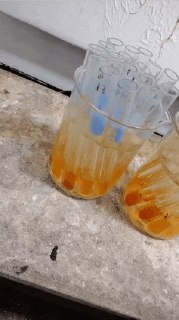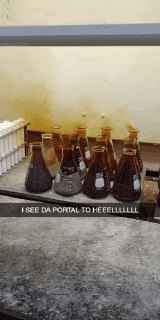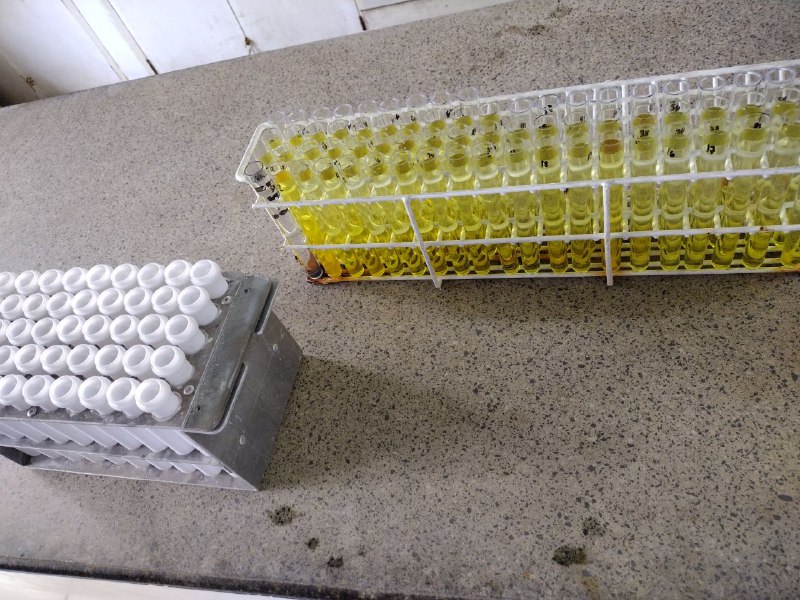Basic digestion methods
It just occurred to me that I’ve been talking about analytical/processing methods already, yet I never once talked about extraction methods before you head to the actual analysis. So I’m just going to make a really quick leaway to introduce acid digestion and the kinds that are so often used in my line of chemistry.
So Acid digestion
This is one way to convert your sample (either solid, or already liquid) into a form that you can use for analysis. This is basically one form of sample preparation that’s done in a more precise and sophisticated manner.
When we say acid digestion. Think of when you eat food then it comes out as poop because your stomach has gastric juices in it (specifically, 0.5% KCl and around the same concentration for other salts in your stomach) only melt down what the body needs. Whatever isn’t needed or is in exces gets discarded in the form of waste. Then whatever gets melted by the gastric juices is what your body absorbs. It works the same way with acid digestion because you have something that can melt down what you need into liquid form (which is the preferred form for when you run it through an instrument), and in most cases, that’s metals, proteins, sugars, etc. Any compound you can think of, I’m pretty sure it will have an equivalent digestion, extraction, leaching or mobilising method for said compound. If not, then a method is probably in development and in validation somewhere And this is one of the beautiful things in chemistry, always changing, always evolving, always adjusting to find solutions.
So before I go on about my undying love for chemistry…
Back to acid digestion XD
In my field, we actually have only the most basic and fundamental digestions for mobilising metals. But back in the old lab I worked for, we had far more complicated methods than what I’ll be discussing here.
Aqua regia digestion
This one is the digestion process I’m kind of torn with… I mean… It’s easy, but it requires a lot of stirring compared to the 4 acid digestion. When we say aqua regia, it refers to royal water. Why? because the end product contains noble metals (gold, platinum, palladium and mercury (though only partially. it would still depend on whether it’s a mercury ore/cinnabar, or mercury as a contaminant). It can’t mobilise silver though), which are often really sought after in the mining field. In most cases, when we get a sample that has aqua regia digestion, we also have to perform gold extraction through smelting. The smelting is done as sort of a back up check in case that the gold concentrations are so high that the instrument has a hard time quantifying the concentration.
An aqua regia solution is one made out of 3 parts concentrated hydrochloric acid and one part nitric acid. The preparation always has to be before use or depending on the lab but I prefer this being prepared in parts like what we do in the lab to ensure that the metals you’re looking for do get leached out completely.
Looking into the individual components of this solution, you have nitric acid (HNO3), which is a powerful oxidising agent capable of converting small amount of gold to Au^(3+)
Then you have your hydrochloric acid (HCl) which is your chloride source. The presence of this allows the metal ions to form salts which stabilises it enough for analysis.

This is a small scale digestion for mercury samples.

Then this is one of the more large scale digestion types we get because usually, gold concentration is low for this sample
Also one trivia I find cool about aqua regia: Formerly, the only use for this solution was to make chloroauric acid then the solution will undergo an electrochemical process to refine the gold in that solution either through gold plating or through gold seeding. Best part is that the gold you can get from this method is at 99.99% purity. Much more pure than the native gold you’ll find in mines that have a much larger silver interference in them.
Then you have a 4-acid digestion
This is done by mixing hydrochloric acid, nitric acid, perchloric acid and hydrofluoric acid. All of these are crazy powerful acids that you may develop a trauma to, especially with hydrofluoric acid ;;-;; that kind of acid doesn’t leave marks like the latter, but it can kill you through internal lacerations by binding to all the calcium in your body ;;-;; and I don’t want to die like that, it’s why I wear a hazard suit whenever I change the bottle of hydrofluoric acid.
Anyways, when in digestion, hydrofluoric acid can dissolve silicate minerals, and when you’re going gold hunting, silicates are the number one thing you need to look out for, because where there’s high silica, there’s always a chance that the ore may contain traces of gold too yet that’s never really enough to mobilise the gold here, that’s why you have strong oxidizers like your nitric acid and perchloric acid to mobilise all the metals then hydrochloric acid again, to stabilise what you mobilised. Chlorides will always be the easier form for analysis and I am definitely thankful for HCl for making my life easier sometimes (despite all the acid burns I got from this).

This is also a small scale 4-acid digestion done as a preliminary check for most of our samples. They check for base metals whenever we do 4-acid here
When choosing between which methods, it’s important to know which metals you really prioritise because the use of 4-acid digestion is for near total digestion, and oftentimes, it’s used as a preliminary check for what kind of metals could be extracted from an unknown ore.
Sources
https://www.rsc.org/publishing/journals/prospect/ontology.asp?id=CMO%3A0001491&MSID=B
https://www.usgs.gov/media/files/aqua-regia-digestion-method
https://edu.rsc.org/magnificent-molecules/aqua-regia/3007792.article
https://link.springer.com/article/10.1007/s00769-006-0238-1
https://www.sgs.ca/en/mining/analytical-services/geochemistry/digestion-and-fusion/multi-acid-4acid-digestions
—-------
And so this ends one part of my chemistry rambles for today, and this is all I can apparently type while I’m on break. Lol why am I so chatty.
Posted with STEMGeeks
!discovery 30
This post was shared and voted inside the discord by the curators team of discovery-it
Join our community! hive-193212
Discovery-it is also a Witness, vote for us here
Delegate to us for passive income. Check our 80% fee-back Program
Congratulations @bananzell! You have completed the following achievement on the Hive blockchain and have been rewarded with new badge(s):
Your next target is to reach 1250 replies.
You can view your badges on your board and compare yourself to others in the Ranking
If you no longer want to receive notifications, reply to this comment with the word
STOPI do not hate chemistry, but I went absent for one class, and I was lost already.
My ChemEng teacher went from Pentane to Pentene and these CH bonds drowned my poor brain mercilessly. And I was hit by the chalk or the eraser, or was it my classmate... I forgot, but it was really a fun subject. Still remember that "Betadine" is actually Povidone Iodine and denatured alcohol contains methanol, lol!
I love digestion, though, my favorite is burgers and fries, but I like gold too!
Kidding aside, you can be a great College Prof, btw, we need more teachers who are passionate of their field of expertise ;)
Keep it up, see you around here on Hive!
~ @oniemaniego from the HiveHealth Team
I do plan to teach when I retire from the lab. So I have... 10-15 more years to enjoy seeing hell and to keep hoping they let me on the mining field before I take my master's and some teaching units to teach chemistry and geochemistry 😅
But don't doze off in class though, I wouldn't want to see you napping while I'm teaching, who knows, maybe a firecracker will find it's way under your seat this time 🤣🤣🤣
I did teach programming classes with the engineering undergraduates, and I keep on randomly calling their names, so they don't even try to blink even if it gets boring for them, XD I guess that's the firecrackers in my class if you're enrolled there, HAHAHA!!!
Quite interesting really, my sister talks a lot about biochem, carbs, lipids, etc. because of her work, it's my first time now hearing about real-life "magic" outside organic chem :D Don't forget to have fun at your lab, so you don't get bored with the routine, but always safety first!
Ohhh a programming teacher. I wish chemistry had programming though since we lack softwares to use on our end for imaging and stuff. I definitely wouldn't fall asleep then if someone taught me molecular docking codes too ;;w;;
Ohh is she a lab tech for pharma? Or a nurse and biology major of sorts? Organic chemistry is surprisingly a much widely taught subject than its inorganic counterpart so I'm not really surprised anymore. And there's no routine for me in the lab since we end up handling a lot of ore research samples too. Those are wild. Some of them fume up and show the path to the underworld 👌🤣🤣
Some new curricula on colleges now have basic programming, not sure on chem tho. It's fun, you should try "Python" because some research folks use it to analyze data faster.
Sounds so interesting, but I have no idea what's that. I visualize playing Tetris, hahahaha
She used to work as QA in the F&B industry, now a research assistant in a Food Lab. She's taking Masters too, I once heard her cry on her 'analytical chem' online class during the lockdowns. XD I guess I shouldn't delve into chem anymore hahahah
I did see on you YouTube where they call it gates of hell or something, where some monster grew out of aluminum and mercury (??), I'm imagining that your job is similar to that (if I haven't seen the photos on your post) 🤣
Ahhh I was planning to learn python but that one applies to when you're doing codes for computational chemistry. I believe nuclear research uses this program a lot, but for ores, trusty excel does the work just fine UwU
Ohhhh your sister is in research, awesome!!!! Lol analytical chemistry is nothing to cry about unless you hate math and numbers. I consider analytical chemistry my best friend now because of the skillset I use for work.
Hmmm I think they call that the elephant foot mixture or something. I see that but it's completely different from what I do
I see you really are a mad scientist, but in a good way! 👩🔬 I wish I was that intelligent like you, then I could have new discoveries for the next generation of humanity to cry about and study in school and I'm gonna be the Father of
Insert Complex Theories Discovered by Me😆🤓 Maybe you can discover a new element out of your acid digestion too, or maybe you can make a clay dough out of that Moon/Martian dust 😝Lol that's why it's the best description I've ever thought up for myself "I'm the mad scientist they warned you about" is very nice to see on my profile 🤣
What kind of crazy theory do you want to pass down to the next generation to add to their suffering? I'm pretty sure they're suffering enough as is 🤣
Very well, I have just one observation. It has been a while since I don't play with stomach physiology but if I remember, in the gastric juices compositions, maybe HCL is the one that plays well with digestion =) and it is the one with 0.5%, but still, we can find KCL and NaCL there in addition.

!1UP
Yeahhh stomach acid has so much chlorides and that keeps your acid and salts stable enough so that it doesn't kill you or melt your insides. Plus those salts help with acid neutralisation then nutrient mobility (if you're familiar with potassium and sodium transport via osmotic pathways)
You have received a 1UP from @gwajnberg!
@stem-curator
And they will bring !PIZZA 🍕.
Learn more about our delegation service to earn daily rewards. Join the Cartel on Discord.
I gifted $PIZZA slices here:
@curation-cartel(4/20) tipped @bananzell (x1)
Please vote for pizza.witness!
Thanks for your contribution to the STEMsocial community. Feel free to join us on discord to get to know the rest of us!
Please consider delegating to the @stemsocial account (85% of the curation rewards are returned).
You may also include @stemsocial as a beneficiary of the rewards of this post to get a stronger support.
Hola @bananzell
Expones un tema bastante complicado en cuanto a su proceso, pero tu lo haces sencillo con esas explicaciones en donde vas comparando el método básico de la digestión con lo que ocurre en el estómago cuando éste hace su función. Es así como dices, la función del metabolismo es "alimentarse" sólo de lo que necesita realmente, el resto es desechado como heces fecales; y claro, la digestión ácida es bastante parecido ya que funde los elementos en su ácido transformándolos en forma líquida para que puedan pasar por los instrumentos. Cuando hablo de elementos son los azúcares, proteínas, minerales, etc. Todos ellos pasan por un método de movilización, digestión, extracción, lixiviación dirigido a dicho compuesto.
A mi también me apaciona la Química y la Física. Saludos @bananzell
Hello @bananzell
You expose a rather complicated subject in terms of its process, but you make it simple with these explanations where you compare the basic method of digestion with what happens in the stomach when it does its function. It is as you say, the function of the metabolism is to "feed" only what it really needs, the rest is discarded as feces; and of course, acid digestion is quite similar since it melts the elements in its acid transforming them into liquid form so that they can pass through the instruments. When I speak of elements, I am referring to sugars, proteins, minerals, etc. They all go through a method of mobilization, digestion, extraction, leaching directed at that compound.
I also have a passion for Chemistry and Physics. Greetings @bananzell